Deadly Outlaw: Rekka
One might reasonably assume that a film called Deadly Outlaw: Rekka would feature, as its central character, someone called Rekka. Oh no. This is a film by Takeshi Miike, the enfant terrible of Eastern cinema and the man behind Ichi the Killer, Dead or Alive and Audition so you know that nothing is as it seems and should really prepare yourself for some outlandish violence, stylised kills and a psychopathic lead character.
The film begins with a 2 to 3 minute segment of very short clips all cut together so you really don't know what the hell is going on, who is who and where Miike is going to take you in the next 90 minutes or so. Things then settle down and you are very quickly introduced to Kunisada, a Yakuza hellbent on revenge because of his boss's death. In the very brief opening sequence, a gangster emerges from a building to which a rival Yakuza boss is heading. With a pistol in each hand, he rapidly dispatches the old man's bodyguards before repeatedly shooting the mob boss who is surprisingly takes everything that is thrown at him and almost manages to strangle his assailant to death but the police arrive in time to finish him off and save the mass murderer.
The only problem with this situation is that the old man's hands are still wrapped round his throat so, as anyone would do the same situation, he takes his pocket knife to the dead man's wrists and simply cuts off his hands. Even then the grip is still fairly strong and the next time you see the killer is when he is undressed and sitting on the settee at home with the severed hands still securely fastened to his neck.
Anyway, with his father murdered, Kunisada isn't happy when his mob decides to mediate with the guilty party's mob, the Otaki who may or may not be backed by the Bando clan. Moving away from the traditional way of bringing 'justice' to an aggrieved Yakuza family, Kunisada and his best friend decide that the only way of truly allowing his father to rest is by killing those behind his murder and the violence escalates from beating up half a dozen people with a crowbar (killing three of them) to handguns and finally a bazooka! Meanwhile, Kunisada's own family decided that he is a menace and that the other families will be satisfied if he is killed but this, as expected, proves much harder than they expect and, when Kunisada finds out, he sets his sights on every Yakuza family in Tokyo.
I knew to expect some degree of cinematic excess from Deadly Outlaw: Rekka and really wasn't disappointed as there are some strokes of genius by Miike who really knows how to tell a decent story and use every tool at his disposal to bring the violence of such a world home. People are brutally beaten up and killed and, when they are, there are a few occasions where the blood flies to such extent that its splats on to the screen or even covers it completely (like in The Evil Dead). You're not supposed to cheer on a psychopathic murderer in films but this is one of those rare cases when the viewers allegiance is firmly with Kunisada. When he took his rocket launcher to the Bando headquarters, aimed it at the front doors and pulled the trigger sending the rocket and the bodyguard who was running towards him straight into the ground floor prior to a massive explosion, I was metaphorically cheering him on!
I wouldn't go so far as to say that this is the finest Japanese gangster movie ever made -- that honour goes to the five Battles without Honor and Humanity films directed by Japanese master filmmaker Kinji Fukasaku. What Takashi Miike does bring to the table is a sense of style that goes against everything that was in Fukasaku's films which tended to be extremely gritty, using hand-held cameras for a sense of documentary realism, and a wicked sense of humour that is extremely dark. There is a degree of authenticity in the film which must be to do with writer Shigenori Takechi and producer Tsuneo Seto who are both former Yakuza. There is an immense central performance by Riki Takeuchi who is your traditional Japanese hard man who cares little for his own life as he knows he will probably die whilst (but hopefully after) completing his mission. If that weren't enough, the film also features the legendary Sonny Chiba.
The Disc
Extra Features
Aside from the original trailer, there are two lengthy featurette on the disc.
Interview with Takashi Miike runs at 18 minutes and was on the Media Blasters release and I doubt that he has anything new to add so Arrow have done well to secure this in-depth interview with the infamous director, sitting next to a poster for Ichi the Killer, speaking in depth about Deadly Outlaw: Rekka rather than his career in general.
Deadly Outlaw: Miike is a lengthy (30:26) interview with the director in which he tackles seven different subjects in the film from the soundtrack to the women and the violence. He answers each question and addresses each topic at great length, not skimping on details or refusing to answer something that could be very tricky to properly answer. These can be played separately or together as there is a 'play all' function.
The set also comes with a booklet containing an essay by Tom Mes, an expert on Miike's work, plus a production stills and notes on Flower Travellin' Band by Sam Jones and a reversible cover which features the Japanese artwork on the reverse side.
The Picture
According to the press release, this version boasts a "brand-new transfer of the film with a new and improved subtitle translation" and I would hate to see the old transfer as this one looks like a grindhouse or old B-movie type of film with white spotting throughout and terrible contrast levels so the blacks have a more grey/green hue and there is one scene in a tunnel by the entire screen is a murky mess of dark grey and green.
This would normally annoy the hell out of me but the aesthetic that seem to suit the film as it is something that is very 'down and dirty' and almost the sort of subject material that you would see on a VHS from the late 1970s. There are a couple of scenes with some very strange editing in which several frames of obviously been removed and a character will be sitting on a settee and then, in the blink of an eye, appear on the other side of the room!
There isn't a great deal of CGI in the film but what there is is fairly unconvincing and ropey, especially when one of Kunisada's rockets causes a whole building to explode, with flames bursting out of the windows on every floor.
The Sound
The only audio option is Dolby Digital 2.0 stereo Japanese with English subtitles and this is where the second part of the boast on the press release ("a new and improved subtitle translation") proves to be very accurate with very good subtitling and there was only one error I spotted when a sentence should have begun with 'If', but didn't.
Apparently Takashi Miike cut the film whilst listening to the Japanese hard rock band Flower Travellin' Band's 1971 album Satori and the music features very promptly throughout the film, as do two of the band members who appear as Kunisada's father and (I think) a mobster who fancies himself as a bit of a musician. The music and the images almost become inseparable and there is a fantastic surreal touch at the end when Kunisada's father reappears, Yoda-like, says "Rock 'n' roll" in English and then disappears!
Final Thoughts
Deadly Outlaw: Rekka is a gangster film that has a vaguely cartoonish quality but one that is unmistakably the work of Takashi Miike. No one else would have a scene in which the protagonist spies some other gangsters and, rather than move on because he's out on a double date with his best friend and a couple of Korean singers, decides to walk straight into the garage, pick up a crowbar and start beating seven kinds of s*** out of them in probably the most outrageously violent scene in the movie.
The way the film finishes is quite interesting because there is a cut to black after the final scene where you think the film has finished but then you have a lengthy scene of the actors eating together as humans, rather than characters and it's almost as if Miike is saying "It's alright, they were just actors and that was just a film." Fans of Miike's other work should definitely think about buying this and if you are just vaguely curious, stick it on your rental list.
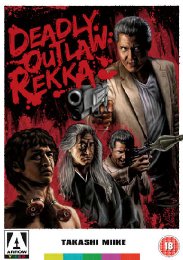
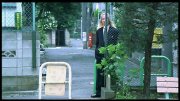
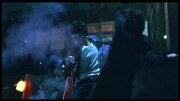
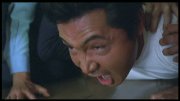
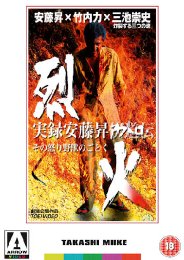
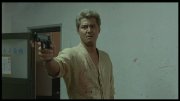
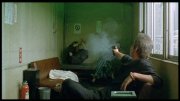
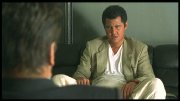
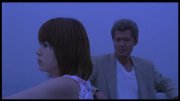
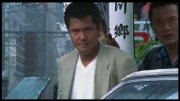
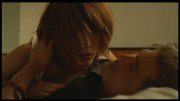
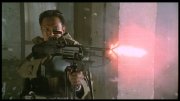
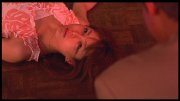
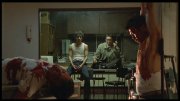
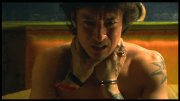





































Your Opinions and Comments
Be the first to post a comment!